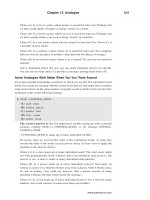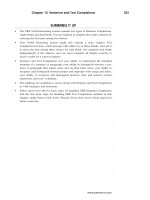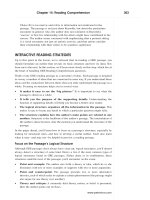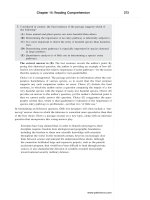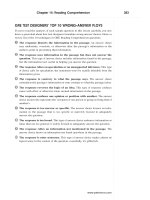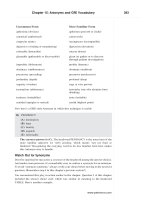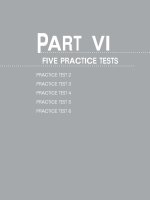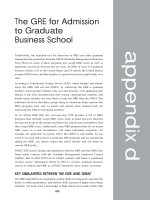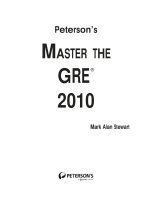Master the Gre 2010 - Part 42
Bạn đang xem bản rút gọn của tài liệu. Xem và tải ngay bản đầy đủ của tài liệu tại đây (48.02 KB, 10 trang )
Uncommon Form More Familiar Form
aphoristic (obvious) aphorism (proverb or cliché)
canonical (authorized) canon (rule)
congruity (unity) incongruous (incompatible)
digressive (winding or meandering) digression (deviation)
estimable (honorable) esteem (honor)
gleanable (gatherable or discoverable) glean (to gather or to discover
through patient investigation)
improbity (dishonesty) probity (honesty)
obstinacy (stubbornness) obstinate (stubborn)
precursory (preceding) precursor (predecessor)
profundity (depth) profound (deep)
sagacity (wisdom) sage (a wise person)
teetotalism (abstinence) teetotaler (one who abstains form
drinking)
testiness (irritability) testy (irritable)
zenithal (upright or vertical) zenith (highest point)
Now here’s a GRE-style Antonym in which this technique is useful:
10. PENDENCY:
(A) domination
(B) hope
(C) finality
(D) anguish
(E) informality
The correct answer is (C). The headword PENDANCY is the noun form of the
more familiar adjective (or verb) pending, which means “not yet final or
finalized.” Recognizing the everyday word in its less familiar form here makes
this Antonym easy to handle.
Watch Out for Synonyms
Don’t be surprised to run across a synonym of the headword among the answer choices.
And under exam pressure, it’s remarkably easy to confuse a synonym for an antonym.
To avoid “synonym syndrome,” always verify your choice before moving to the next test
question. (Remember step 4 in this chapter’s previous section?)
You encountered this ploy in action earlier in the chapter. Question 2 of this chapter
included the answer choice stall, which was similar in meaning to the headword
TABLE. Here’s another example:
Chapter 15: Antonyms and GRE Vocabulary 393
.................................................................
..............................................................................................
www.petersons.com
11. GAUCHE:
(A) hard-working
(B) gentle in manner
(C) financially secure
(D) soothing to listen to
(E) lacking in tact
The correct answer is (B). GAUCHE means “lacking social graces; tactless,” so
choice (E) provides a synonym, but if you’re not careful you might select choice
(E), just because it is related in meaning to GAUCHE. You’d be wrong, of course.
Choice (B) provides the best antonym. Although it is not a perfect description of
what a gauche person is not, gentle in manner comes closest among the five
choices.
Just because two answer choices are close antonyms of each other, don’t assume that
one is the correct choice (an antonym of the headword) and that the other is a
synonym of the headword. For example:
12. FETTER:
(A) criticize
(B) relax
(C) unleash
(D) cajole
(E) confide in
The correct answer is (C). Choices (A) and (D) are close antonyms of each
other. To cajole is to persuade by flattery, which runs contrary to the meaning of
criticize. But neither criticize nor cajole is related to the headword. To FETTER is
to bind or chain, just the opposite of unleash.
HOW THE GRE TESTS YOUR VOCABULARY
The rest of this chapter is devoted solely to GRE vocabulary, which comes into play in all
four Verbal Reasoning question types:
Antonyms: Among all four Verbal Reasoning question types, Antonyms test your
vocabulary most directly. Without at least an inkling of the meaning of the
headword, you’re essentially left to random guessing. The tougher the vocabulary
used as a headword and in the answer choices (and the greater the number of
tough words), the tougher the Antonym. It’s that simple.
Analogies: In Analogy questions, you need to create and identify links between
words, so without at least some understanding of what the words mean, you won’t
be able to determine relationships between them. The tougher the words (and the
greater the number of tough words) among the capitalized pair and answer
choices, the tougher the Analogy.
Sentence and Text Completions: All of the answer choices in Sentence and
Text Completion questions are words or phrases. The broader your vocabulary, the
PART V: Verbal Reasoning394
.................................................................
..............................................................................................
ALERT!
Don’t be fooled by answer
choices that are antonyms of
each other. It’s possible that
neither one is the correct
answer.
www.petersons.com
easier time you’ll have determining which word or phrase makes the most sense
in each sentence. The tougher the vocabulary in the answer choices—as well as in
the sentence or text itself—the tougher the question.
Reading Comprehension: Although Reading Comprehension does not
emphasize vocabulary, tougher passages contain more advanced vocabulary,
which obviously increases the reading difficulty level. The test designers might
boost difficulty levels further by incorporating tough vocabulary into a question
itself (the question stem, the answer choices, or both). Also, you might encounter
one or more vocabulary-in-context questions, for which your job is to determine
what the word means within the passage’s context. So, of course it helps if you’re
already familiar with the word.
HOW GRE TEST DESIGNERS CHOOSE VOCABULARY
The GRE test designers want to determine whether you possess a well-rounded
vocabulary—the kind you need to read, write, and speak effectively in graduate school
and beyond. Most advanced words are fair GRE game. But there are certain types of
words that the test designers are most likely to use and other types that they don’t use
at all.
The test designers’ favorite types of words:
• Those that are uncommon enough that a large percentage of test takers won’t
know them, but not so obscure that almost no test takers will know them
• Uncommon words with roots and prefixes that provide useful clues about what
they mean
• Words that might remind you of certain other words but that mean something
else
• Distinctive words whose definitions are nearly impossible to guess, and that only
well-read and well-prepared test takers will know
Types of words the test designers don’t use:
• Highly technical words typically understood only by specialists or experts in
certain academic fields and professions
• Non-English words not widely used among English speakers and non-English
words with diacritical marks or non-English characters
• Archaic English words that are no longer in everyday use
• Vernacular and informal words (jargon, slang, and colloquialisms)
To help you understand how the test designers choose words to measure your
vocabulary, consider these three words:
bib
bibelot
bibliophile
Chapter 15: Antonyms and GRE Vocabulary 395
.................................................................
..............................................................................................
NOTE
On the GRE, vocabulary is
measured most directly
through Antonyms, which is
why you’re learning about
GRE Antonyms and GRE
vocabulary together in this
chapter.
NOTE
Why won’t you encounter
vernacular and informal words
on the GRE? Because one of
the basic objectives of higher
education—whether it’s
undergraduate or graduate
study—is to help you express
ideas without resorting to such
words.
www.petersons.com
You might encounter a word like bib (a cloth hung around the neck) on the GRE,
particularly in an Analogy test item. (For example, BIB is to STAIN as “guard” is to
“crime.”) But the test designers wouldn’t be interested in bib for the purpose of
gauging your vocabulary, because it’s a common word with which nearly all college
students are familiar.
As for the word bibelot (a small relic or artifact), you might encounter it in a Reading
Comprehension passage, but only if the passage provides its meaning. Otherwise, the
test designers are unlikely to use this word to measure your vocabulary. Why? Since
it’s a technical word specific to one academic field—anthropology—so few GRE test
takers would know the word that the test designers would essentially be wasting a
GRE question by using it.
The word bibliophile (a person who collects and/or appreciates books) is quite test-
worthy indeed, for the purpose of rewarding test takers who have a strong vocabulary
and who might very well be familiar with the word. Even if you’re not, you may be
able to figure out its meaning by dissecting it: It’s derived from the Greek words
biblio, which means “book” (think of the word “bibliography”), and philo, which means
“love.”
Words That Contain Helpful Clues
In addition to using Greek, Latin, and other non-English word branches that you might
need to memorize for the GRE, the test designers also like to use words with other
commonly known root words, in one form or another. In an easier GRE question, an
uncommon word’s meaning will be similar to, or at least consistent with, its root word.
Here are three examples:
EFFLUENT (n): waste matter emitted by a sewage treatment or industrial
plant (the imbedded root is fluent)
OBEISANCE (n): a physical demonstration of respect—for example, bowing
or saluting (the root is obey)
RECIDIVISTIC (adj): characterized by habitual repetition of or return to
unlawful or immoral behavior (the root is recede)
But don’t count on words having common roots always being so easy to figure out. A
tougher word might contain a root that provides only a vague clue as to what the
larger word means, as in these two examples:
GAINSAY (v): to deny, refute, or contradict
UPSTART (n): a person who has become arrogant or overly confident as a
result of a sudden rise to a position of higher status
Words that contain two roots (a compound word) sometimes send mixed messages
about what they mean, as in these two compound words:
SPENDTHRIFT (n): a person who is overly free or undisciplined in spending
money
VERISIMILITUDE (n): the appearance of truth
PART V: Verbal Reasoning396
.................................................................
..............................................................................................
TIP
If you were paying attention to
the preceding paragraph, you
no doubt gathered that
knowing Latin and Greek (as
well as Anglo-Saxon) roots and
prefixes will help you score
high on the GRE Verbal
Reasoning section.
TIP
When you encounter an
unfamiliar word on the GRE,
look for a familiar root to help
you guess its meaning. But
don’t rely too heavily on that
guess. Try your best to answer
the question based on what
you know for sure.
www.petersons.com
The bottom line is this: When you encounter an unfamiliar word in the GRE Verbal
Reasoning section, by all means look for a familiar root to help you guess the word’s
meaning. But never assume that your guess is always going to be right—or even close.
Nevertheless, you can use your “root” knowledge to avoid random quesswork in
answering test questions.
Words with Clues That Throw You Off Track
To increase the difficulty level of the vocabulary in an Antonym, Analogy, or Sentence
and Text Completion, the GRE test designers avoid providing obvious clues about a
word’s meaning. They opt instead for words with roots that belie the word’s meaning.
Look out for two varieties:
A word that looks or sounds like another but is either entirely unrelated or only
tenuously related:
BADINAGE (n): teasing conversation; jesting; banter (no relation to bad; think
“badminton” instead)
PRURIENT (adj): lewd; lustful (no relation to prudent)
CAUSTIC (adj): corrosive; sharp (only tenuously related to cause)
A word whose meaning is contrary to the meaning of its root but that might lead
you to guess just the opposite (that they’re similar):
ENERVATE (v): to deprive of vitality; debilitate (contrary to energize)
FACTITIOUS (adj): contrived; not genuine; artificial; counterfeit (contrary to
factual)
RESTIVE (adj) restless; impatient (contrary to restful)
Oddball Words
The most challenging type of GRE word is one that doesn’t look or sound like any other
English word and that contains no obvious root or prefix to help you guess its meaning.
Some such words are modern non-English words that English speakers have adopted
(either as is or with a slightly different spelling). Others are words that are derived from
ancient languages but that are still in use today. Here are three examples of the kinds of
test-worthy words whose meanings you couldn’t guess if you didn’t know them:
IOTA (n): a very small quantity; speck
BURGEON (v): to begin to grow, develop, or blossom, especially suddenly
INVEIGLE (v): to lure or entice by inducements
The only way to be ready for oddball words on your GRE is to study lists of advanced
vocabulary words. But if you don’t have time, take solace: On the GRE, you won’t find
nearly as many of these odd words as you will words that contain roots and prefixes to
help you make reasoned guesses about definitions. Remember: The GRE is designed
primarily as a reasoning test, not as a trivia quiz.
Chapter 15: Antonyms and GRE Vocabulary 397
.................................................................
..............................................................................................
ALERT!
Words in tougher GRE
questions might contain
deceptive-looking roots.
Whenever you’re uncertain
about which of two answer
choices is better, consider the
possibility that an unfamiliar
word means just the opposite
of what many test takers might
think.
NOTE
Expect to find a few unusual
words on the GRE whose
definitions you’d have to
memorize to know—but also
expect many unfamiliar words
to contain roots and prefixes
that help you make reasoned
guesses as to what these
words mean.
www.petersons.com
